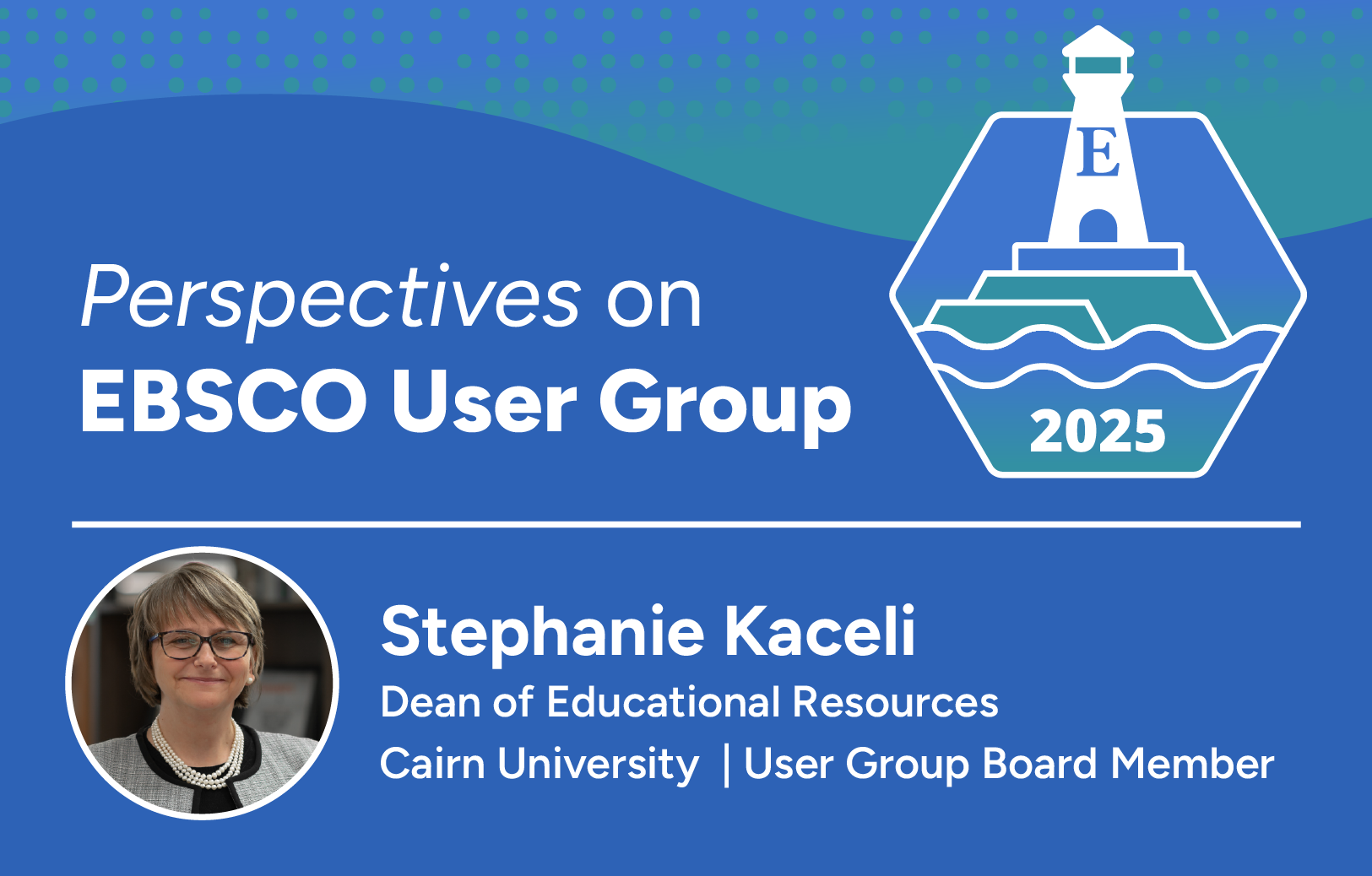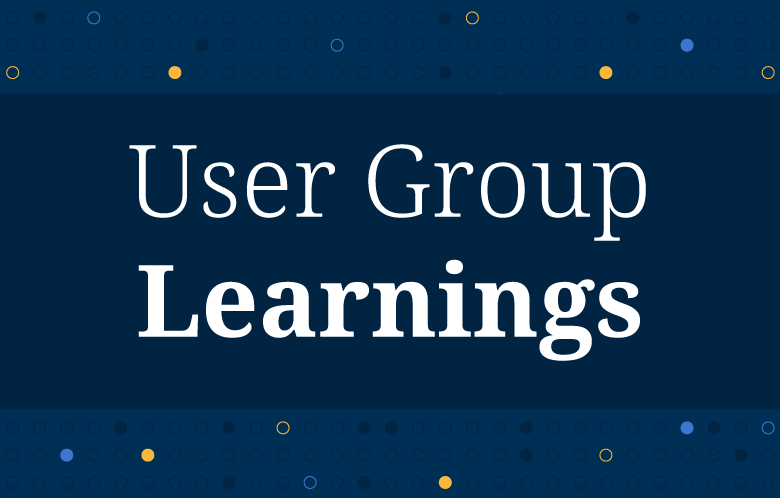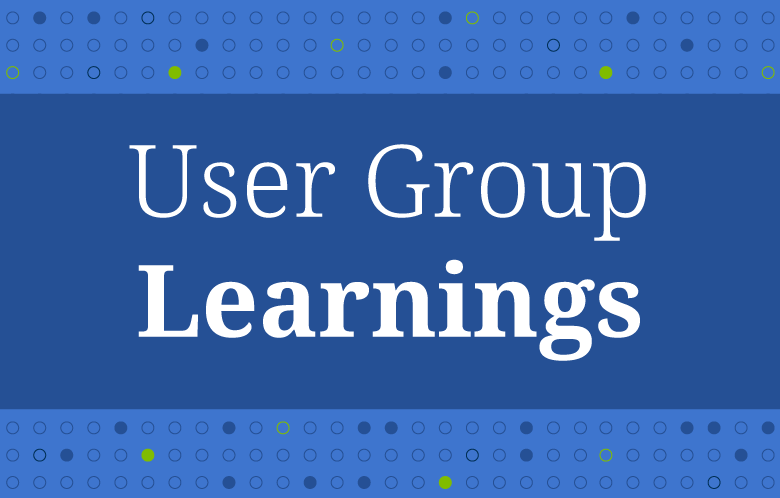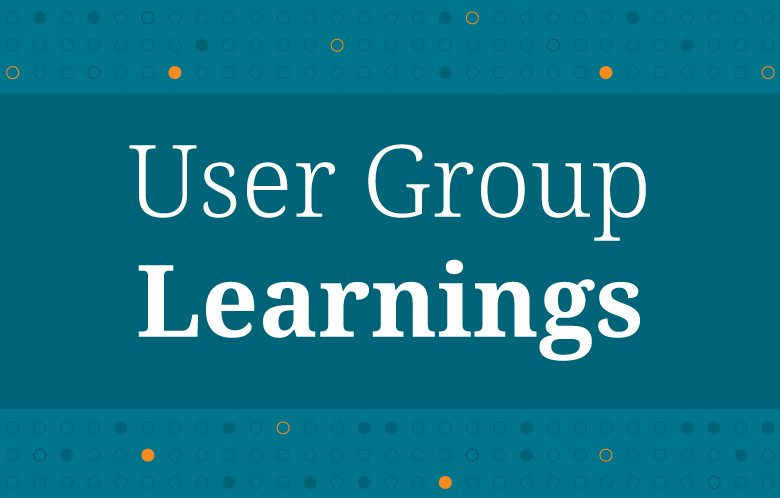In this first installment of our Perspectives on EBSCO User Group series, we hear from Stephanie Kaceli, Dean of Educational Resources at Cairn University and EBSCO User Group board member, as she shares her insights into the conference’s impact, standout moments and advice for future attendees. Board members play a critical role in shaping the User Group, ensuring that sessions align with the community’s needs and that the event meets attendees’ expectations. Stephanie’s perspective offers a behind-the-scenes look at how the User Group fosters meaningful dialogue, drives innovation and strengthens the connection between EBSCO and its users.
What was your favorite part of the User Group this year (2025)?
My favorite part of the EBSCO User Group is usually the tips, tricks and tools I bring back to work. This year, at the 2025 meeting, I came away with my pocket full of updates, but as an introvert, I was struck by how a sea of tables or a hopping reception became a chance to connect. The User Group’s uniquely welcoming atmosphere turned crowded rooms into meaningful conversations. At meals or receptions, I’d dive into topics, like swapping insights over a session, theory, or how libraries and EBSCO tackle this shifting landscape. This setup, making time for valuable sessions and networking, struck a chord this year and is what makes attending the EBSCO User Group a non-negotiable for me.
What inspired you to join the User Group Board, and what has the experience been like?
I joined the EBSCO User Group Board because I love diving into the details of bringing people together. It started with a conversation with Andrew Nagy after the first Mid-Atlantic FOLIO User Group, where we discussed my passion for community-building and how I could contribute to the EBSCO User Group, especially FOLIO Day. I asked to get involved, and here I am!
As I plan the fourth Mid-Atlantic FOLIO User Group for October 2025, I’ve realized how much joy I find in creating spaces for librarians—whether from tiny, small, medium, or large libraries (or consortia)—to share ideas. On the board, I’ve helped shape the program, pored through surveys to find victories and areas of improvement and have brought back comments and suggestions from attendees to the board for consideration.
A highlight of my year was the opportunity to work with the EBSCO team and some of the original board members. These individuals lead a variety of systems, consortia and libraries with a clear goal of serving the library community.
What are your tips for an EBSCO User Group first-timer?
Put on your seatbelt, for this is a busy three to four days! Do not try to do everything, but do not miss the breakfasts, lunches and networking opportunities. And, it is not about the food! I know how daunting it is to walk into a room where you know no one or very few people, but push through, sit down, and you will be amazed at the humanity—and the sheer genius—of each and every person you interact with. You never know who you may meet, but the common denominator is that we are passionate about what we do and we want to hear about you! And just wait: the following year, you will begin to meet up with those you met last year and find you have made forever connections.
How do you see the role of the User Group evolving in the next few years?
I know it will evolve because every year is about improving and adapting. This year, the board held a session to listen to feedback, which will be discussed when we debrief from the conference.
In future meetings, I hope the board creates a way to better support first-time attendees and adds sessions for product forums where we—the users—help solve real-time problems.
Big picture? Though our numbers grow every year, I would like the group to focus on enlarging who we rub elbows with, or, if you will, a more 360-degree approach between attendees and presenters: we learn more when we hear all perspectives. The timing of the User Group for academic libraries makes it difficult to attract more forward-facing librarians and paraprofessionals. Still, we’ll be better off if we figure this out. The Providence venue’s layout sparked great cross-institutional conversations, and we can build on that.
Additionally, it’s tough to fit all things FOLIO into five to six time slots on Day Three of the User Group. What would it be like if EBSCO FOLIO content was folded into the main event, rather than a separate day? I think this could allow for richer discussions across all EBSCO products, fitting more into our packed schedules without losing depth.
What’s one thing you wish more people knew about the EBSCO User Group?
First, the User Group is not a sales pitch. It’s an opportunity to keep your ear to the ground regarding what is new (or coming soon), how to use products better, how to make products better and a time to work out some issues with the help desk—or with others—who have figured it out already. Do you have an EBSCO product? The EBSCO User Group is for you.
Secondly, the people who work so hard to make the magic happen. Truly, the EBSCO User Group team that puts in so many hours so that we can have a seamless experience is remarkable. The friendliness, professionalism and diligence are unmatched. Plus, they’re all really, really fun people. As a board member, I see this team working year-round and am blown away. Beyond that, there has never been a time that I have seen this group shy away from feedback, positive or negative. No wonder the User Group is such a success with this strong foundation.



